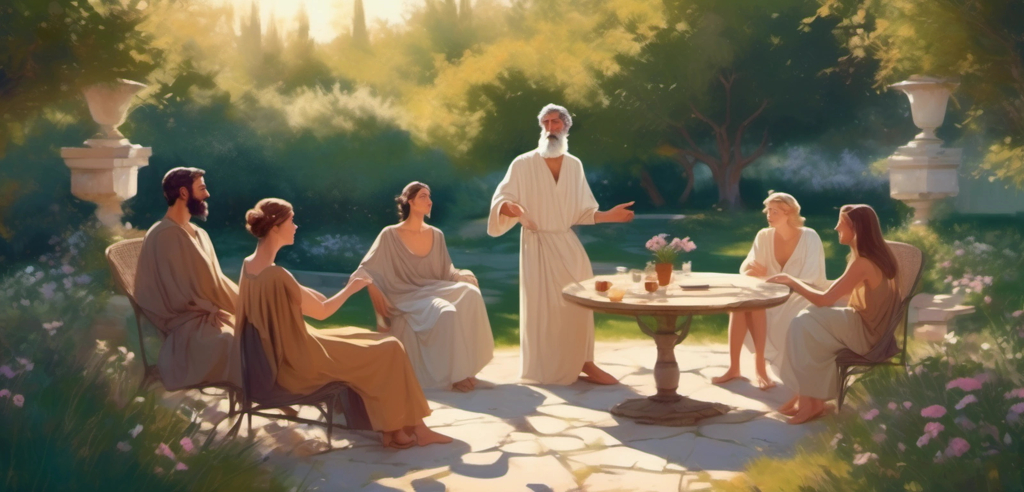
Epicureanism
- A cool guide to Epicurean Paradox

cross-posted from: https://lemmy.ca/post/21918776
> - > - Author: /u/aw-junaid > - Link Shared on Reddit > - Original Reddit Comments >
- AI reads text from ancient Herculaneum scroll for the first timewww.nature.com AI reads text from ancient Herculaneum scroll for the first time
Machine-learning technique reveals Greek words in CT scans of rolled-up papyrus.

- Recommendations for Epicurean reading

---
I made a post in /r/Stoicism a while ago when someone asked about books for Epicureanism. I'll just repost it here (maybe we could make a reading list for the sidebar?):
The influences of Epicurus spread through much of the writings of other philosophers and major historical figures. Prominent examples include Isaac Newton, Karl Marx, and Thomas Jefferson. In fact, the pursuit of happiness part from Jefferson's Life, Liberty, and the pursuit of happiness was likely heavily influenced by Epicurus.
Essential reading material
-
On the Nature of Things by Lucretius (c. 55 BCE). Here's the translation I have. Most of Epicurus' writings have unfortunately not survived. As a result, this remains the best primary resource for those wishing to study Epicureanism.
-
The fragments of Epicurus (c. 270 BCE). Best of all, these are free! I put them together into a PDF here that you can easily download to view on your computer or print out for a physical copy.
-
Letter to Menoeceus from Epicurus (c. 270 BCE). A great introductory text whereby Epicurus essentially summarizes his philosophical teachings.
Recommended Reading of Classical Sources
-
The Cambridge Companion to Epicureanism, ed. James Warren (2009). A much more academic text, but extremely well put together and well sourced.
-
The Cambridge Companion to Lucretius, ed. Stuart Gillespie and Philip Hardie (2007).
-
On the Nature of the Gods (De Natura Deorum) by Cicero (c. 45 BCE). This one is a dialogue laid out in three books, each of which discuss the theology of different Roman and Greek philosophers. The dialogue uses a discussion of Stoic, Epicurean, and skeptical theories to examine fundamental questions of theology. Cicero is particularly hard on the Epicureans, though he does his best to remain impartial.
-
On the Ends of Good and Evil (De finibus bonorum et malorum) by Cicero (c. 45 BCE). Cicero explains the philosophical views of Epicureanism, Stoicism, and the Platonism of Antiochus of Ascalon.
-
The Epicurean Inscription by Diogenes of Oinoanda (c. 200 CE). An Epicurean Greek from the 2nd century AD who carved a summary of the philosophy of Epicurus onto a portico wall in the ancient city of Oenoanda in Lycia (modern day southwest Turkey). The surviving fragments of the wall, which originally extended about 80 meters, form an important source of Epicurean philosophy. The inscription sets out Epicurus' teachings on physics, epistemology, and ethics. It was originally about 25 000 words long and filled 260 square meters of wall space. Less than a third of it has been recovered.
-
Lives of Eminent Philosophers, book X by Diogenes Laërtius (c. 215 CE). A biographer of many great philosophers, including Epicurus.
-
The Art of Happiness by Epicurus and others (c. 270 BCE - 2012 CE). This is a collection of Epicurean writings, including Epicurus' fragments. It also includes some of Lucretius' writings from the above work, plus other stuff that you can read in the Amazon description, so keep that in mind when considering buying.
-
The Protagoras dialogue by Plato (c. 380 BCE). A discussion on the relationship between pleasure, knowledge, and the good.
-
The Apology dialogue by Plato (c. 399 BCE). Plato's version of the speech given by Socrates as he defended himself in 399 BC against the charges of "corrupting the young, and by not believing in the gods in whom the city believes, but in other daimonia that are novel" (24b).
-
Odes and Epodes by Horace (23 BCE). The poetry of Horace (born 65 BCE) is richly varied, its focus moving between public and private concerns, urban and rural settings, Stoic and Epicurean thought.
-
The Essential Epicurus by Epicurus (1993), trans. Eugene O'Connor—all of Epicurus' fragments (all of which would be in either the fragments link above, or in The Art of Happiness).
-
Epicureanism by Tim O'Keefe (2009). Part of the Ancient Philosophies series of books.
Books to Avoid
- The Swerve by Stephen Greenblatt (2011). This book has been oft-criticized as having a Dan Brown-esque reading style. My biggest complaint however would be that it doesn't properly portray Epicureanism in a well researched way. Not only that, the author makes it clear in his writing that he has a problem with mainstream religion (namely Christianity). This directly contradicts with Epicurean teaches, with the philosophical school being more inclined towards accepting the beliefs of others. If you aren't convinced yet, my last complaint is that the writing is very unfocused, constantly shifting between the 15^th century and a rough sketch of Epicurus in ancient Greece.
Edit: Post other recommendations here for others to see! I'll update the list since this is making up the sidebar at present.
-
- Valuable Epicurean Vocabulary

Because Epicureanism fell out of favour for so much of history there are many Epicurean terms which either have not become common parlance or whose meaning is not immediately apparent. Even the term Epicurean itself has been distorted. Here is a list of some of the more useful terms which appear in Epicurean studies. Feel free to add more in the comments. Hope all is well.
Aponia – An absence of pain. For Epicurus pleasure was maximised when you no longer experienced any pain.
Ataraxia – A state of profound tranquillity. Ataraxia is achieved when you have no more worries or fears at all.
Apatheia – The Stoic analogue of Ataraxia. Apatheia is the state of mind achieved when the passions are controlled, perhaps even entirely removed.
Clinamen- This is the term given by Lucretius which describes the random motion of atoms in a void. In the atomic theory of the Epicureans without this random swerving then atoms would not have been able to form larger objects by collision. The random swerve also prevents the universe from being deterministic.
Epicurean epistemology – Epistemology is the study of truth and knowledge. How do we know what we know? Epicureanism has three main routes to knowledge. Sensations (aisthêsis) are the information our sense organs receive and refer to the mind. These are always right, though we may misinterpret what we are sensing. Preconceptions (prolepsis) are those ideas which all people share, universal ideas. Feelings (pathê) are those things which are true for us, our own sense of pleasure for example. A square of very dark chocolate may make me happy but it is not a universal experience.
Eudaimonia – An objective goal of a philosophy. Eudaimonia can be translated as ‘good spirited.’ Eudaimonia is the state a philosophy aims to place its practitioners in, a state in which they are flourishing. It varies from philosophical school to school but for Epicureans Eudaimonia is pleasure (as understood by Epicureans, see Hedonism).
Gods – Epicurus was parodied by other philosophers as being an atheist. His surviving letters show that he did believe in gods, but perhaps not in a way they or we would recognise. The gods of Epicurus were beings within the universe, composed of atoms, and utterly unconcerned with human affairs. They lived lives of ataraxia and aponia.
Hedonism – Named for the goddess embodiment of pleasure – Hedone. Hedonism is the pursuit of pleasure. There are many schools of hedonistic philosophy, of which Epicureanism is one. Hedonism can be the mindless chasing of any pleasurable activity or a more refined study of the maximising of pleasure in a rational manner. Epicurus explains some the possible confusions hedonism can imply- > When we say . . . that pleasure is the end and aim, we do not mean the pleasures of the prodigal or the pleasures of sensuality, as we are understood to do by some through ignorance, prejudice or wilful misrepresentation. By pleasure we mean the absence of pain in the body and of trouble in the soul. It is not by an unbroken succession of drinking bouts and of revelry, not by sexual lust, nor the enjoyment of fish and other delicacies of a luxurious table, which produce a pleasant life; it is sober reasoning, searching out the grounds of every choice and avoidance, and banishing those beliefs through which the greatest tumults take possession of the soul. —Epicurus, "Letter to Menoeceus
Katastematic pleasure – Literally - Pleasure at rest. A katastematic pleasure is a pleasure one feels from ‘being.’ So aponia is the katastematic pleasure one feels when you are without pain.
Kinematic pleasure- Literally - Pleasure in motion. Kinematic pleasures are derived from ‘doing.’ The pleasures of eating, drinking, conversation, those derived from the senses.
Otium – A Latin term which has a number of distinct meanings. For Epicureans Otium was the quiet joy of an unassuming, contemplative, life. Thus otium is at odds with the Romantic idea that heroic struggle is something to be sought out.
Materialism – The belief that matter is the main constituent of the universe and that all phenomena are derived from the interactions of matter and the laws of the universe. Epicureanism is a materialist philosophy because it does not posit immaterial souls, or spirits, or gods made of divine stuff. Not to be confused with a love of material things.
Soul – When Epicureans refer to the soul they generally mean consciousness or mind. The Epicurean soul is composed of atoms and does not survive the destruction of the body.
Tetrapharmakos- A short summary in four parts of the beliefs of Epicurus recorded by the Roman Epicurean Philodemus. > Don't fear god, Don't worry about death; What is good is easy to get, and What is terrible is easy to endure.